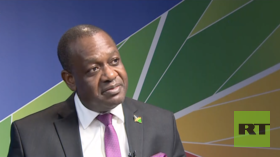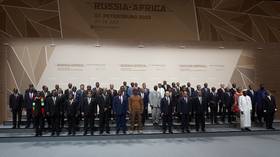Namibian FM hails ‘sound relations’ with Russia

Namibia and Russia continue to strengthen their longstanding partnership through both political and economic engagement, Namibian Minister of International Cooperation Peya Mushelenga has told RT correspondent Donald Courter in an exclusive interview.
Speaking on the sidelines of the Ministerial Conference of the Russia-Africa Partnership Forum, Mushelenga highlighted the close ties established through the intergovernmental commission, which convened in Moscow in March to explore avenues for collaboration.
“Namibia and Russia enjoy sound relations both politically and economically,” he stated.
Mushelenga said the recent talks had underscored mutual interests in energy, agriculture, education, IT, and peace and security.
A technical team has been set up to explore geophysics and geochemistry “in order to try to see how we can unearth some potential minerals in Namibia,” the minister said.
Mushelenga acknowledged the countries’ historical bonds, as “the Soviet Union by then was one of the countries that stood shoulder to shoulder with Namibia in the fight against apartheid colonialism.”
According to the minister, this legacy continues today, with Russia providing educational support. Currently, around 300 Namibian students are studying in Russia in fields such as engineering and medicine.
Russia and Namibia established diplomatic relations on March 21, 1990, and have since developed cooperation in the political, economic, trade, and humanitarian spheres.
The inaugural ministerial conference, hosted on the Sirius Federal Territory near the city of Sochi on the Black Sea, was held on November 9-10 and featured more than 40 ministers from across Africa.
Meanwhile, Russia and Namibia are aiming to boost trade and investment in various sectors, as announced by Russian Foreign Minister Sergey Lavrov following talks with his Namibian counterpart in March.
Lavrov highlighted opportunities for cooperation in mineral resources, energy, agriculture, tourism, and healthcare. Both countries expressed a desire to resume regular consultations on political and economic matters, alternating meetings between Moscow and Windhoek.













